In this article:
Hibiscus is a powerful hair-nourishing herb, which explains its widespread use in hair care products. However, these products often come with added chemicals that can strip the moisture from your hair and scalp after repeated use.
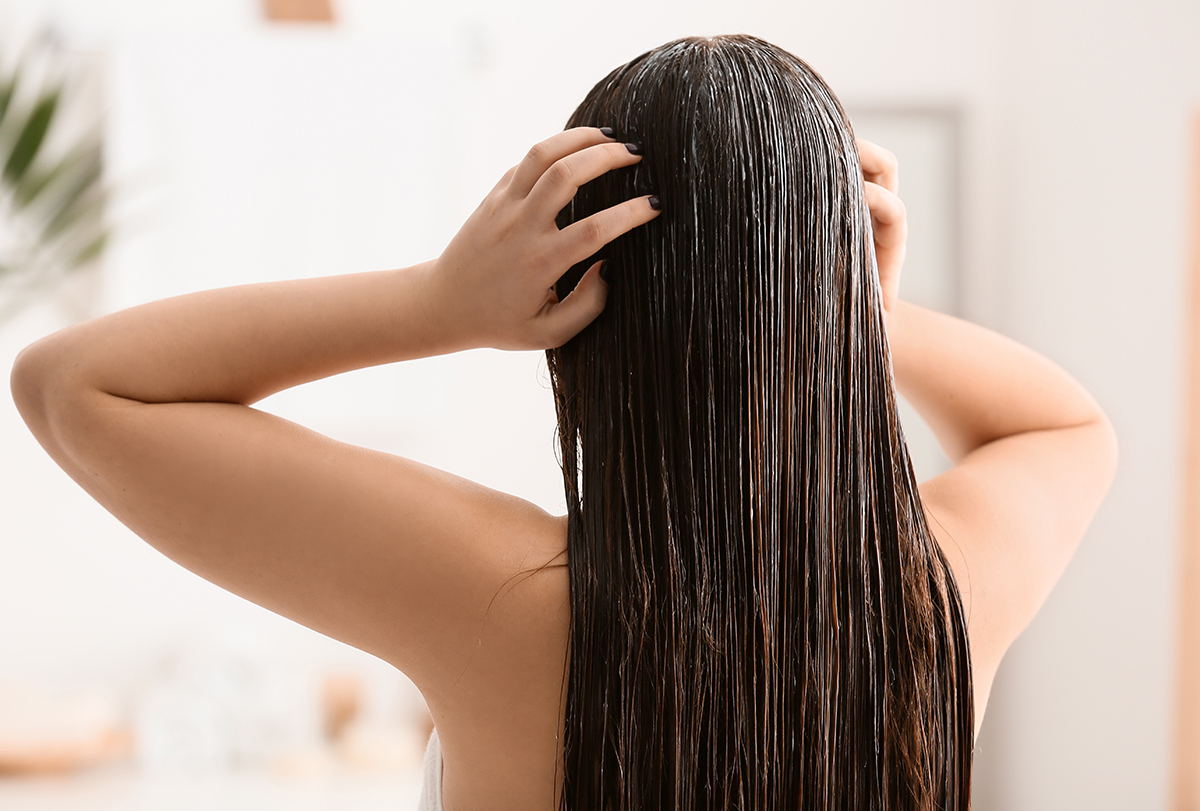
So why waste your money on overpriced hair care products when you can derive the natural goodness of hibiscus through DIY hair masks that are easy to make and chemical-free. Plus, these hair masks contain the added benefits of other hair-friendly ingredients, including aloe vera, honey, yogurt, and rosemary essential oil.
Hibiscus leaves and flowers contain various nutrients and amino acids that help nourish hair follicles, strengthen hair roots, repair hair shaft, and stimulate cell proliferation for faster hair growth. (1) These homemade masks deeply condition your hair and help reduce hair fall by strengthening the strands from the very root, in addition to fighting a whole range of other hair problems. (1)
Thus, including hibiscus in your hair care regimen can improve the strength, texture, appearance, and overall health of your hair and scalp, without causing any adverse side effects. This is why these deeply conditioning hair masks are definitely worth a try.
Hair damage can take some time to reverse once it occurs, but hibiscus can help accelerate the hair repair process.
Know Your Ingredients
Here’s the list of ingredients to be used in the hibiscus hair masks for ensuring silky, smooth hair.
1. Hibiscus
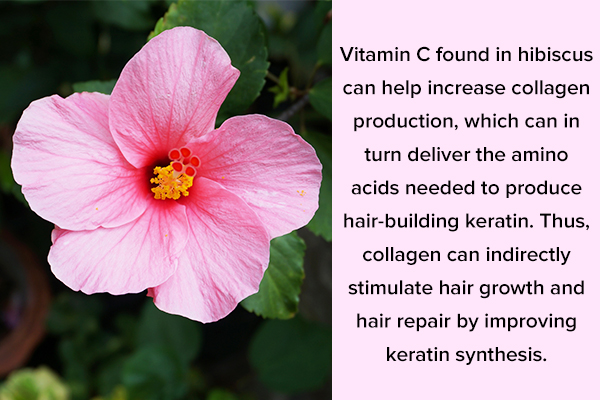
The primary component of hair is a protein called keratin, which is synthesized by the body using certain amino acids. Some of these amino acids are found in collagen, another structural protein that makes up most of your skin.
The abundant reserves of vitamin C found in hibiscus can help increase collagen production, which can in turn deliver the amino acids needed to produce hair-building keratin. Thus, collagen can indirectly stimulate hair growth and hair repair by improving keratin synthesis. (2) Moreover, collagen can also help strengthen the skin around the hair follicles to keep your hair firmly rooted in the scalp.
Vitamin C also works as a strong antioxidant that neutralizes free radical activity. Free radicals are unstable molecules that damage pigment-producing cells in the hair to induce premature graying.
2. Aloe vera
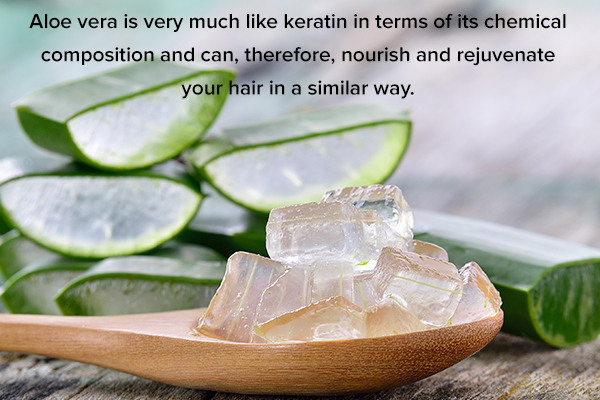
Aloe vera is very much like keratin in terms of its chemical composition and can, therefore, nourish and rejuvenate your hair in a similar way.
This cool, hydrating gel can help moisturize and soothe a dry, itchy scalp, making it a godsend for people suffering from dandruff. Plus, its antifungal properties help remove any excess oil or grime from the scalp that contribute to dandruff.
Aloe vera is also credited with antimicrobial properties that can help fight scalp infections. It works as an antifungal to keep dandruff under control.
Additionally, aloe vera contains several hair-building vitamins, namely, vitamins A, C, E, and B12, along with a good amount of folic acid. (3) All these nutrients together can help make your hair long, strong, smooth, soft, and lustrous.
Aloe vera also can improve blood circulation in the scalp to deliver more nutrients to the hair follicles. This helps stimulate fast hair growth while curbing hair fall and a host of other hair or scalp problems. Lastly, aloe vera helps maintain a healthy scalp pH to promote better hair growth and prevent dandruff.
3. Honey
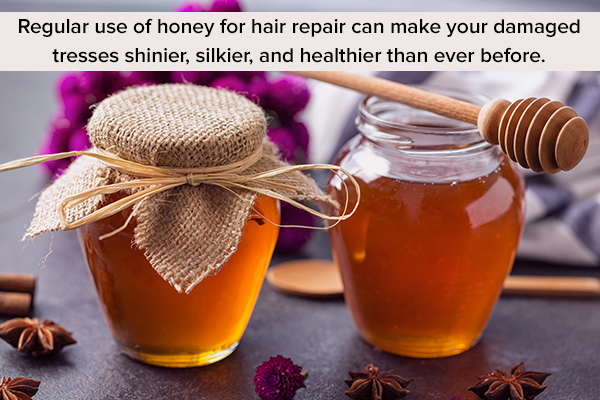
Being a natural humectant, honey not only imparts moisture to your hair and scalp but also locks it in to prolong the hydrating effect. It works as a powerful antioxidant (4) to curb free radical activity, which causes premature graying and other forms of hair damage.
The significant antibacterial and antiseptic properties of honey can help keep scalp infections at bay. It also contains hair-nourishing vitamins and minerals that can help resolve the problems of hair fall, split ends, and dry, brittle hair.
Regular use of honey for hair repair can make your damaged tresses shinier, silkier, and healthier than ever before. (5)
4. Yogurt
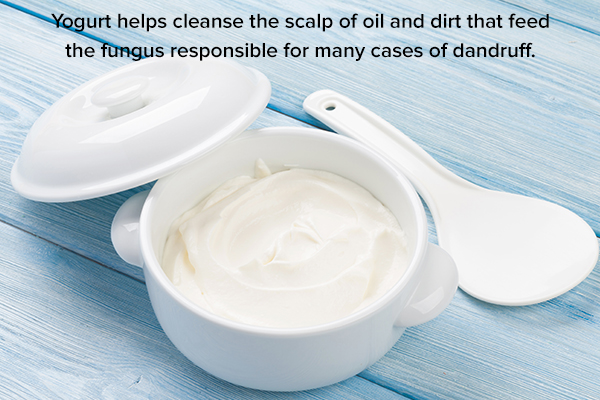
Yogurt helps cleanse the scalp of oil and dirt that feed the fungus responsible for many cases of dandruff. (6) It also helps to regulate the pH levels of the scalp.
Yogurt deeply moisturizes your hair to make them soft, frizz-free, and manageable. It also contains hair-nourishing nutrients that can impart a healthy bounce and shine to your tresses when used regularly.
5. Rosemary essential oil
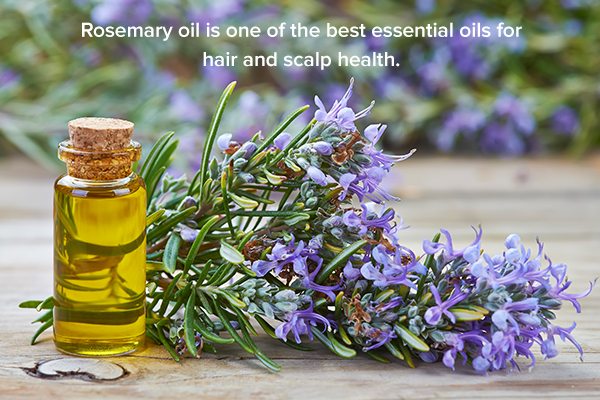
Rosemary oil is one of the best essential oils for hair and scalp health. It is readily absorbed in the scalp and activates cell proliferation in the hair follicles to produce thick, long, and strong hair. (7) This therapeutic potion also helps reduce hair loss and premature graying of hair.
Hibiscus Hair Mask Recipes
Here are some simple ways to make a hibiscus hair mask at home.
DIY hibiscus and aloe vera hair mask
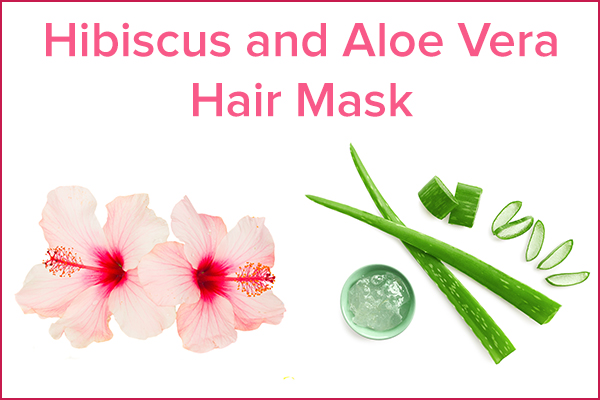
Ingredients
- 3–4 tablespoons of hibiscus petal paste
- 1 cup of aloe vera gel
How to prepare
- Take freshly plucked hibiscus flowers, wash them thoroughly, pluck the petals, and grind them to a paste.
- Put 3–4 tablespoons of hibiscus petal paste in a clean bowl, and add 1 cup of aloe vera gel to it.
- Mix the ingredients until you get the consistency of a smooth paste.
How to use
- Apply the paste all over your hair and scalp, and then wear a shower cap to keep the mask from transferring or dripping.
- Let it sit for at least 40–50 minutes before washing it off with a mild shampoo and plain water.
- Follow it up with a conditioner, and then finally rinse your hair with plain water.
- Use this mask once or twice a week.
DIY hibiscus and yogurt hair mask
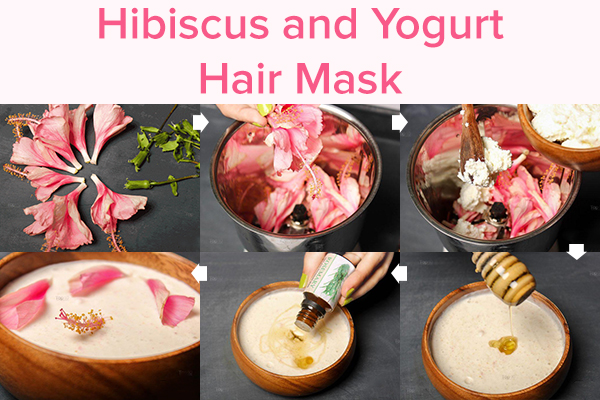
Ingredients
- 8–10 fresh hibiscus flowers
- 3–4 tablespoons of yogurt
- 1 tablespoon of honey
- A few drops of rosemary essential oil
How to prepare
- Wash the hibiscus flowers and then remove the petals from the stalk.
- Put the petals in a grinder to make a paste.
- Add 3–4 tablespoons of plain yogurt into the grinder, and blend the ingredients until they form a smooth paste. You can also add a little water to improve the consistency.
- Transfer the paste into a clean bowl.
- Mix 1 tablespoon of honey into the paste.
- You can add a few drops of rosemary essential oil to the mix, but this completely optional.
How to use
- Wash your hair and let them air-dry.
- The best time to apply the mask is when your hair is still damp but not soaking wet, as this helps lock in the moisture in your hair and scalp.
- You can use your fingers or a hairbrush to apply the hair mask to your scalp and the entire length of your hair, making sure that every strand is covered.
- Wear a shower cap to cover your hair, and let the hair mask sit for about 30 minutes.
- After the waiting period, wash your hair with water and a mild shampoo to thoroughly rinse out the mask. Skip the conditioner if you normally use one.
- Use this mask one or two times a week.
The basic recipe
- Wash a handful of hibiscus leaves and flowers (stem removed).
- Put them in a small grinder, add a bit of water, and then blend them to form a smooth paste. If you only have a large grinding container, increase the quantity of the leaves and petals. Grinding small quantities in a large container can leave behind chunks.
- Apply the mask all over your hair and scalp. Wear a shower cap to avoid dripping.
- Let your hair and scalp soak in the goodness of the mask for about 30–40 minutes before washing it off with a mild shampoo and plain water.
Pro-Tips
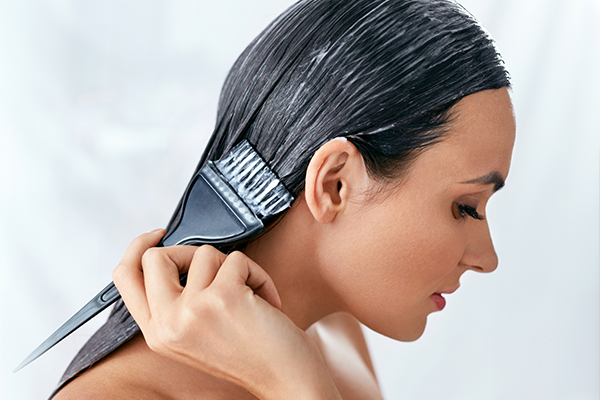
- Wash off any dust, grime, or other impurities settled on the hibiscus flowers before using them in your mask.
- Try to use fresh hibiscus leaves and flowers from a healthy plant to make these masks. Don’t take flowers from a diseased or pest-infested plant.
- If you don’t have a grinder, simply use a mortar and pestle to grind the ingredients of these masks.
- You can use soaked fenugreek leaves as a substitute for aloe vera gel.
- Adding a little lemon juice to these hair masks can help relieve dandruff and the associated itchiness.
- If you are having a hard time finding hibiscus flowers, you can use hibiscus powder instead, which is easily available on the market.
Final Word
Your hair will instantly feel soft and look healthy after using these hydrating masks, but these effects will wear off without a consistent hair care regimen.
So, you must use these masks regularly for several weeks to make any long-term improvement to the condition of your hair. Besides, hair growth and hair repair are gradual processes that cannot be sustained by topical treatments alone.
Eating a well-balanced, healthy diet will help nourish your hair from within, which is why it is an essential part of any hair care routine.
- Was this article helpful?
- YES, THANKS!NOT REALLY


